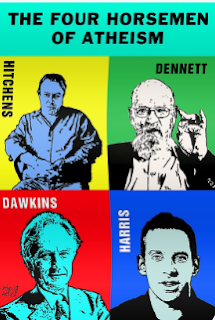They were called the Four Horsemen of New Atheism. It's the early 2000s and the term New Atheism is taking off. Philosophers and scientists Daniel Dennett, Richard Dawkins and Sam Harris have joined forces with journalist Christopher Hitchens to declare that not only is there no God but that everybody should understand this.
The outworking of this new belief system was most vividly
shown in the 2009 bus poster campaign which boldly declared ‘There is probably
no God. Now stop worrying and enjoy your life.’
But people did worry. And still worry. In the end, New Atheism
was shown to be little more than a hotchpotch of old ideas, vaguely linked to
science and philosophy. When the four horsemen began to fall out with each
other, the decline was inevitable.
There was actually a fifth horseman – or horsewoman. Ayaan
Hirsi Ali was a disciple of Richard Dawkins, proposing strong atheistic views. Originally
from Somalia, she later moved to the Netherlands and then the United States,
becoming increasingly well known for her opposition to extreme Islam and to Woke
Identity.
In November 2023, Hirsi Ali declared her new-found faith in
Christ. If New Atheism hadn't already been struggling, it now was. Hirsi Ali found
the ‘long term sense of life without spiritual solace’ to be ‘unendurable’.
Ayaan Hirsi Ali inevitably concluded that there was a God.
The Bible says that there is a God shaped hole in our lives (Ecclesiastes 3:11)
and no amount of atheistic argument can ever fill it. That's the journey Hirsi
Ali went on and it is a journey repeated by many.
An appreciation of nature and a scientific understanding of
the details of biology and creation suggest that there must be more to life than
a vague view that all we see is a chemical accident. In fact, many scientists
reach the conclusion that there has to be a God.
Another well known ‘conversion’ is that of the British
writer AN Wilson. Initially a cynic of everything Christian, he found himself
drawn back to faith. His experience of atheism simply did not match his
experience of real living.
Wilson said:
‘Materialist atheism says we are just a collection of
chemicals. It has no answer whatsoever to the question of how we should be
capable of love, of heroism, of poetry, if we're simply animated pieces of meat.’
Wilson went on to conclude ‘The more I read the Easter
story, the better it seems to fit and apply to the human condition. That is why
I now believe in it.’
There is a sense of Christian revival in the UK. Many from
Generation Z are rejecting atheism and materialism, realising there must be
more to life than this.
There is.
For a much
deeper consideration of these issues, I recommend ‘The Surprising Rebirth of Beliefin God’ by Justin Brierley. Much of this article finds its roots in that book.

